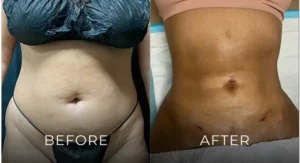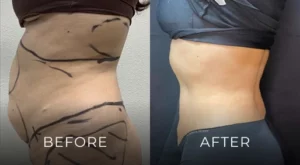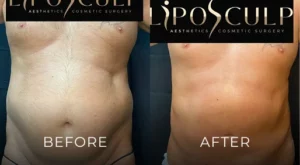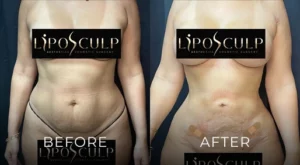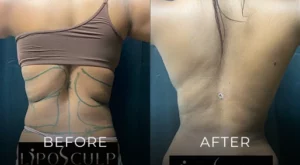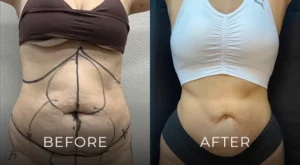Is Liposuction Permanent?
When considering cosmetic procedures to reshape the body, many patients wonder about the long-term results of liposuction. This advanced treatment removes unwanted fat cells from specific areas, like the abdomen, thighs, arms, and back. However, understanding the permanence of liposuction results requires looking beyond the operating room and into lifestyle factors that may affect outcomes over time. Let’s explore these nuances and see how liposuction can help you achieve your aesthetic goals.

Are the Results Permanent?
Liposuction results can be permanent if patients maintain a stable weight through diet and exercise. The fat cells removed during the procedure are permanently gone from those specific areas, preventing future fat accumulation in treated regions. However, significant weight gain after liposuction can cause the remaining fat cells to expand and develop new deposits, potentially altering the surgical results. For long-lasting outcomes, patients must commit to lifestyle changes that support weight maintenance following the procedure.
Why Results Can Change Over Time
Expansion of Remaining Fat Cells
While liposuction achieves substantial fat removal from targeted areas, the body still retains some fat cells in these regions. If patients gain weight after surgery, these remaining cells can expand significantly, accumulating fatty tissue that may compromise the initial sculpted appearance. The body’s natural response to weight gain doesn’t distinguish between treated and untreated areas, meaning that even modest weight increases might affect liposuction results over time.
Lifestyle Choices
Daily habits directly impact liposuction longevity, with diet and exercise being the most influential factors. Patients who maintain consistent physical activity and balanced nutrition preserve their results longer. Conversely, those returning to sedentary behaviors or poor eating habits often experience gradual changes to their body contour. Alcohol consumption, smoking, and high-stress levels can also affect metabolism and fat distribution, potentially altering the surgical outcome regardless of the procedure’s technical success.
Aging
The natural aging process affects everyone’s body composition, including those who have undergone liposuction. As we age, metabolism typically slows, skin elasticity decreases, and fat distribution patterns shift — particularly after hormonal changes caused by menopause or andropause. These inevitable biological changes can modify liposuction results over decades, with some patients noticing their body shape gradually evolving despite maintaining a stable weight. Skin laxity significantly contributes to this phenomenon, as older skin doesn’t contour to underlying structures as effectively as younger tissue.
How to Preserve the Results of Liposuction Procedures
Follow Post-Operative Instructions
The success of any body-contouring procedure largely depends on how well the patient adheres to their surgeon’s post-operative guidelines. These instructions typically include wearing compression garments, avoiding certain activities, attending follow-up appointments, and properly caring for incision sites. Following these directions meticulously not only aids healing but also helps optimize the final contours achieved through liposuction. Patients who disregard post-operative instructions risk complications that could compromise their results, including irregular contours, excessive swelling, or infection that might necessitate corrective procedures.
Maintain a Stable Weight
Perhaps the most crucial factor in preserving liposuction results is maintaining a stable body weight following the procedure. While this surgery removes fat cells permanently from treated areas, significant weight fluctuations can distort appearance. Weight gain causes remaining fat cells to expand, potentially creating disproportionate body contours, while rapid weight loss might lead to skin laxity. Aim to stay within 5-10 pounds of your post-recovery weight to ensure the sculpted proportions achieved through liposuction remain intact for years.
Eat a Balanced, Healthy Diet
After investing in liposuction surgery, maintaining a nutritious diet becomes essential for preserving your results. Focus on consuming lean proteins, complex carbohydrates, healthy fats, and abundant fruits and vegetables while limiting processed foods, refined sugars, and excessive sodium. These dietary choices help prevent inflammation and water retention that can mask your surgical results. Additionally, proper nutrition supports skin elasticity and healing, enhancing the overall outcome of your procedure and preventing the accumulation of new fat deposits in both treated and untreated areas.
Stay Hydrated
Proper hydration plays a surprisingly significant role in maintaining liposuction results. Drinking adequate water — typically 64 ounces or more daily — helps flush toxins from your system, reduces post-surgical swelling, and supports optimal healing. Well-hydrated skin appears more elastic and toned, enhancing the contoured appearance achieved through liposuction. Additionally, staying hydrated helps regulate appetite, potentially preventing overeating that could lead to weight gain. Make water your primary beverage, and consider tracking your intake to stay adequately hydrated throughout the day.
Avoid Excessive Alcohol
Limiting alcohol consumption is crucial for preserving liposuction results because drinking contributes to excess fat accumulation in several ways. Alcoholic beverages are typically high in empty calories that can lead to weight gain, with some cocktails containing hundreds of calories per serving. Furthermore, alcohol impairs judgment around food choices, often leading to poor nutritional decisions. It also disrupts sleep patterns and impacts liver function, which plays a key role in fat metabolism. For optimal long-term results, consider reserving alcohol for special occasions only, and always consume it in moderation.
Do Not Smoke
Smoking severely compromises the longevity of liposuction results through multiple mechanisms. Nicotine constricts blood vessels, impairing circulation and oxygen delivery to healing tissues, which can lead to complications and suboptimal aesthetic outcomes. The toxins in cigarette smoke damage collagen and elastin, accelerating skin aging and potentially causing the skin to become lax over treated areas rather than contracting smoothly. Additionally, nicotine is associated with poor wound healing and increased infection risk during recovery. For the best possible results, quit smoking entirely before your procedure and commit to remaining smoke-free permanently.
Exercise Regularly
Regular physical activity prevents new fat cells from developing after liposuction. Incorporate cardiovascular exercise to burn calories and strength training to build muscle mass, increasing your metabolic rate. While exercise won’t help you lose weight specifically in treated areas, it prevents overall fat accumulation that could distort your results. Aim for at least 150 minutes of moderate activity weekly, gradually increasing intensity as your recovery progresses. Beyond maintaining your liposuction results, regular exercise offers numerous health benefits that complement your improved physical appearance, including better mood, increased energy, and enhanced overall well-being.
Manage Stress
Stress management deserves attention when maintaining liposuction results, as chronic distress triggers hormonal changes that promote fat storage and weight gain. High cortisol levels encourage abdominal fat deposition — a common area treated with liposuction. Implement stress-reduction techniques, such as meditation, deep breathing exercises, yoga, or regular leisure activities you enjoy. Many patients find that addressing the psychological aspects of body image and implementing healthy coping mechanisms leads to better maintenance of their physical results. Consider stress management as preventative maintenance for your liposuction investment.
Get Adequate Sleep
Quality sleep profoundly impacts your ability to maintain liposuction results in the long term. Sleep deprivation disrupts hunger hormones, increasing ghrelin (which stimulates appetite) and decreasing leptin (which signals fullness). This often leads to increased caloric intake and weight gain. Poor sleep also elevates cortisol levels, prompting the body to store fat, particularly around the abdomen. Aim for 7-9 hours of uninterrupted sleep each night by establishing a consistent sleep schedule, creating a restful environment, and avoiding screens before bedtime. Prioritizing sleep quality is a simple yet powerful strategy for preserving surgical results.
Protect Your Skin
Maintaining skin health is crucial for preserving liposuction results, as poor skin quality can undermine even the most successful fat removal. Protect your skin from sun damage by applying broad-spectrum sunscreen daily, as UV exposure breaks down collagen and elastin fibers that help tissues remain firm against your new contours. Incorporate skincare products containing retinoids, peptides, and antioxidants to improve elasticity and texture. For areas with stretch marks or mild laxity, treatments like radiofrequency or ultrasound therapy may help tighten the tissues further. Remember that healthy, resilient skin complements and enhances the body sculpting achieved through liposuction.
LipoSculp Offers Premier Liposuction Services
LipoScup delivers exceptional body contouring results through our comprehensive liposuction techniques. Our experienced surgeons specialize in tumescent liposuction, the gold-standard procedure that minimizes bleeding and discomfort while enhancing recovery times. We permanently remove fat cells using cutting-edge technologies, including VASER, which liquefies fat before extraction for smoother results and reduced trauma to surrounding tissues. Each customized treatment plan is designed during a thorough consultation, ensuring your unique aesthetic goals are achieved with the most appropriate techniques for your body type.
Conclusion
While patients often wonder how much weight they can lose through liposuction, it’s crucial to understand that this procedure is designed for body contouring rather than significant weight reduction. Techniques like laser-assisted liposuction may enhance results by tightening skin while removing fat, but maintaining these improvements requires a healthy lifestyle. The permanence of liposuction ultimately depends on your post-procedure habits. The fat cells removed will never return to those areas. However, weight gain can still affect your overall appearance. We recommend maintaining a regular exercise routine, eating a healthy diet, and avoiding stress as much as possible to achieve excellent long-term results.
Schedule a consultation today to select the most appropriate liposuction technique for your unique body and goals.
